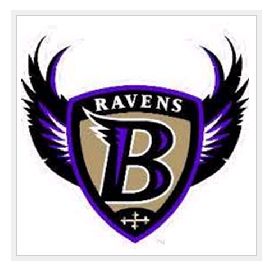This article first appeared in Entertainment Law Matters, a Frankfurt Kurnit legal blog.
Bouchat v. NFL Properties LLC, No. 11 Civ. 2878 (Nov. 19, 2012).
The Baltimore Ravens may be off to an impressive 9-2 start this NFL season, but the club's defensive line (of lawyers) couldn't hold off a successful copyright infringement claim by security guard and artist Frederick Bouchat based on the unauthorized inclusion of his Ravens logo design in a football video game. The November 19, 2012 decision by Judge Marvin J. Garbis of the United States District Court for the District of Maryland was the latest in a longstanding series of lawsuits brought by Bouchat against the NFL, the Baltimore Ravens and others for their unauthorized use of a derivative of his Ravens logo.
Here's the highlight reel.
In late 1995, Bouchat created and obtained a copyright in the "Shield Drawing," which he faxed over to the Maryland Stadium Authority when he heard that Baltimore was finally getting back an NFL team:1

Apparently due to a mix-up at the licensing division of the NFL, a substantially similar "Flying B Logo" was used as the Raven's primary logo during the team's first three (1996-1998) seasons:

Bouchat sued the Ravens and the NFL and established copyright infringement, but recovered no damages due to a jury finding that the revenues generated from various Ravens merchandise (e.g., t-shirts, caps, souvenir cups, and other items bearing the Flying B Logo) – the only infringing materials then at issue – "were attributable entirely to factors other than the Defendants' infringement of Bouchat's copyright." Bouchat v. Baltimore Ravens Football Club, Inc., 346 F.3d 514, 519 (4th Cir 2003).
Undeterred, Bouchat has continued to assert claims based on subsequent uses of his logo, including three uses that Judge Garbis addressed in his latest decision. On cross-motions for summary judgment, the court determined that two challenged uses of the logo – in stadium displays relating to Baltimore sports history and in documentary videos that included footage of the inaugural Ravens team – were non-infringing fair uses. However, as to the third use, which involved the inclusion of the Flying B Logo in Electronic Art's (also a defendant in the lawsuit) Madden NFL video football game, the court determined that fair use did not apply. Specifically, the '10, '11 and '12 versions of game included a "throwback uniform" feature that allows game players to adorn their virtual NFL team in decommissioned uniforms, including the original Ravens uniform from the 1996-1998 era with the infringing logo.
Applying the four-factor fair use analysis, the court first held that the use was "totally or virtually non-transformative" because unlike the uses of the Flying B Logo in the stadium displays and documentary films, which were "necessary to present accurate depictions of historically significant artifacts," the game used the logo "to augment sales of its product by seeking to profit from the 'nostalgia value' gained from the use of the infringing work in the very same manner as the original use." With respect to the second and third factors, the court ruled that the nature of the work – an original drawing – weighed against a finding of fair use, as did the amount copied, because the entirety of the logo was used. The fourth factor, the effect on the market, also weighed against fair use because the "NFL recognizes that there is a market to exploit the nostalgia value of throwback uniforms, choosing to have modern teams . . . play official games in throwback uniforms[.]" Thus, "it only stands to reason that there is a potential market for the Flying B Logo."
Presumably, the case will now proceed to the damages phase, where Bouchat again will attempt to recover "any profits of the infringer that are attributable to the infringement." 17 U.S.C. § 504(b). For many copyright practitioners, this is where the case will get especially interesting, because it raises the thorny issue of profit attribution in copyright cases. Perhaps to prod the parties into settlement discussions, Judge Garbis gave a preview of his thinking on this point, noting that "it is fair to conclude that the throwback uniform feature would not have been added to the Game without a determination by EA that there was commercial value (even if a small one) to the addition of a feature that included the use of the Flying B Logo." The judge further observed what he believed to be key distinctions between the use of the logo in merchandise and in the game:
It must be emphasized that the allocation of the value of the use of the Flying B Logo in the throwback uniform feature is not the same as the allocation of value to the sale of licensed merchandise at issue in earlier lawsuits. With regard to merchandise (for example, caps, tee shirts, etc.), it may make no difference whether the Flying B Logo or some other logo is used to signify affiliation with the Ravens. However, in the Game throwback uniform feature, it is the Flying B Logo and no other that adds the desired "nostalgia value."
We will keep you posted. Oh, and let's go Ravens!
Footnote
1. Baltimore natives, including Judge Garbis and the author of this blog entry, were dismayed by the NFL's longstanding refusal to grant the city a football franchise after the Colts abruptly left for Indianapolis one snowy winter's eve in 1984. Judge Garbis couldn't resist taking a jab at the NFL when discussing the NFL's defense of its use of the infringing logo in a stadium display (discussed below) on the ground that the M&T stadium was like a museum: "The Court must note the ironic happenstance that the NFL benefits from analogizing M & T Stadium to a museum. No Baltimore football fan can forget the unappreciated suggestion made by NFL Commissioner Paul Tagliabue, when refusing to grant a franchise to Baltimore, that the city use the funds set aside for a stadium to build a museum. Perhaps the NFL will now agree with the Baltimore fans who said, when the Ravens opened their stadium, 'Mr. Tagliabue, this is our museum.'"
This alert provides general coverage of its subject area. We provide it with the understanding that Frankfurt Kurnit Klein & Selz is not engaged herein in rendering legal advice, and shall not be liable for any damages resulting from any error, inaccuracy, or omission. Our attorneys practice law only in jurisdictions in which they are properly authorized to do so. We do not seek to represent clients in other jurisdictions.
